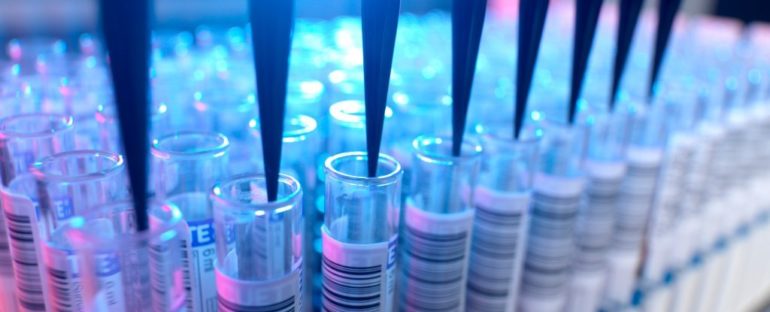Moderna will start trialling its experimental mRNA-based HIV vaccine as early as tomorrow (19 August), according to a new submission to the US National Institutes of Health Clinical Trial registry.
The Phase 1 trial will reportedly involve 56 healthy adults aged 18 to 50 who do not have HIV, and will test the safety of the vaccine as well as look for a basic immune response. The vaccine candidate is functionally similar to the mRNA system that’s been so successful in Moderna’s COVID-19 vaccine.
For years, researchers have been investigating the potential of mRNA vaccines, but the Pfizer and Moderna COVID-19 vaccines are the first to have been used in humans, and both have been shown to be safe and broadly successful at preventing and reducing severity of SARS-CoV-2 infection.
Moderna will be trialling two versions of its new vaccine candidate, officially called mRNA-1644 (the variant is known as mRNA-1644v2-Core). This is the first mRNA vaccine against HIV to be trialled in humans.
There will be four groups as part of the trial – two receiving a mix of the vaccine versions, and two receiving one or the other.
At this early stage, the trial isn’t ‘blind’, which means everyone who receives the vaccine will know what they’re getting. That’s because right now the researchers aren’t trying to work out how well the vaccine works. This first phase will last approximately 10 months, and they just want to make sure it’s safe and that it mounts a basic immune response.
If the vaccine passes this phase, they will still need to go through phase 2 and phase 3 trials to determine how well they work at preventing HIV infection in the broader population.
So how do mRNA vaccines work? Unlike traditional vaccines, which usually contain some part of a weakened or inactivated virus, mRNA vaccines contain an ‘instruction booklet’ that’s passed into our cells and tells them how to make fragments of specific proteins that sit on the outside of the target virus.
For a short period of time (usually 24 to 48 hours), our cells start to make these proteins, and our bodies mark them as foreign and mount an immune response. Hopefully that means when you’re exposed to the actual virus, your body will recognize the spike proteins and be quick enough to fight it off before infection becomes too severe.
According to the Moderna clinical trial submission about its HIV vaccine candidate: “The hypothesis is that sequential vaccination by a germline-targeting prime followed by directional boost immunogens can induce specific classes of B-cell responses and guide their early maturation toward broadly neutralizing antibody (bnAb) development through an mRNA platform.”
That’s a bit wordy, but stimulating those broadly neutralizing antibodies (bnAbs) is important when it comes to HIV.
We’re already very good at using antivirals to treat HIV and reduce the risk of someone exposed getting infected.
But making a vaccine against the virus has proved difficult because of how rapidly it infects our DNA and is able to readily mutate its structure.
The most promising approach we have is stimulating those broadly neutralizing antibodies, which some people naturally develop against HIV – but which we haven’t been able to trigger with a vaccine so far.
However, an mRNA approach may be different. Earlier this year, research from the International AIDS Vaccine Initiative and Scripps Research tested a component of the mRNA vaccine candidate – the immunogen – but using a non-mRNA system.
While the vaccine candidate didn’t mount the full immune response needed, 97 percent of participants developed the desired immune response – the early stimulation of B cells.
“We and others postulated many years ago that in order to induce bnAbs, you must start the process by triggering the right B cells – cells that have special properties giving them potential to develop into bnAb-secreting cells,” said immunologist William Schief who led the Scripps Research team back in February.
“In this trial, the targeted cells were only about one in a million of all naïve B cells. To get the right antibody response, we first need to prime the right B cells. The data from this trial affirms the ability of the vaccine immunogen to do this.”
This same immunogen will now be used in this new trial in conjunction with Moderna’s mRNA system, which has been so useful against SARS-CoV-2.
The hope is that the combination will result in broadly neutralizing antibodies that are capable of fighting off HIV infection in the first place – and may also be effective against a range of other viruses in the future, such as the ‘next pandemic’. The new trial is run in partnership with the Bill and Melinda Gates Foundation.
In an announcement to shareholders in April, Moderna said it’s also developing another HIV vaccine candidate in addition to mRNA-1644, called mRNA-1574. And mRNA vaccines are also being investigated to prevent a variety of other viruses, such as the herpes simplex virus and influenza.
While the COVID-19 pandemic continues to rage around the world, it’s promising to see that some of the technology we’ve developed to fight it could also help us to prevent other devastating viruses in the future.
You can read more about Moderna’s Phase 1 trial here.



